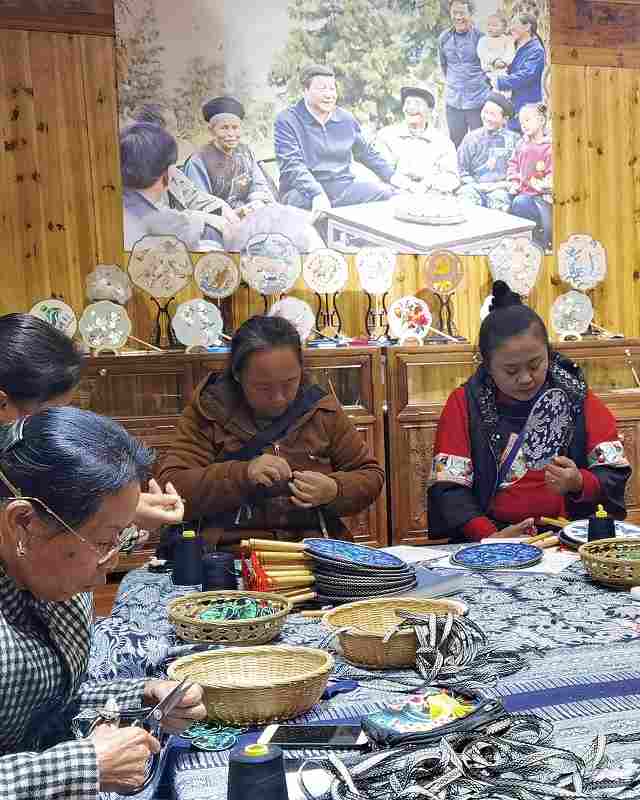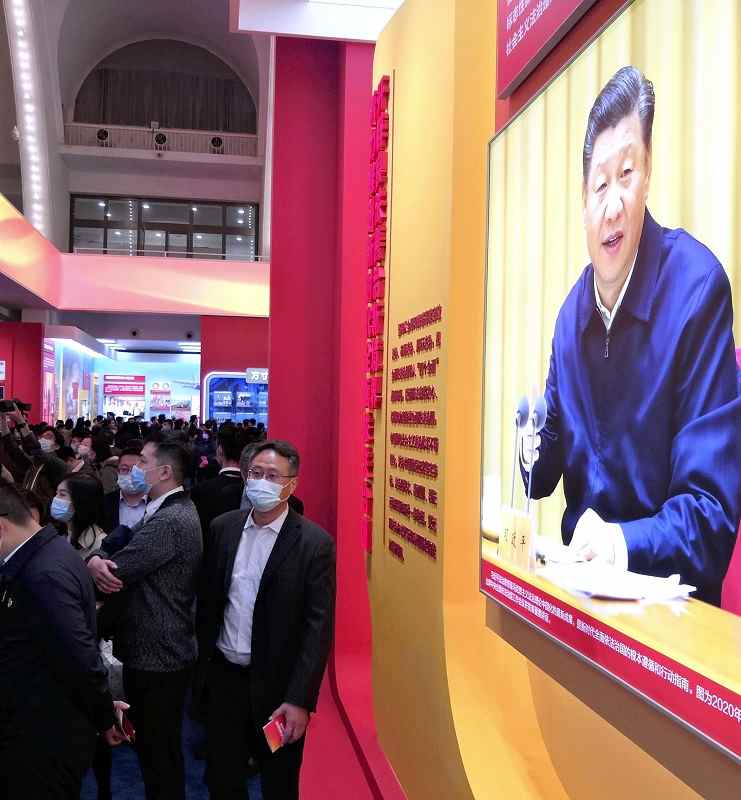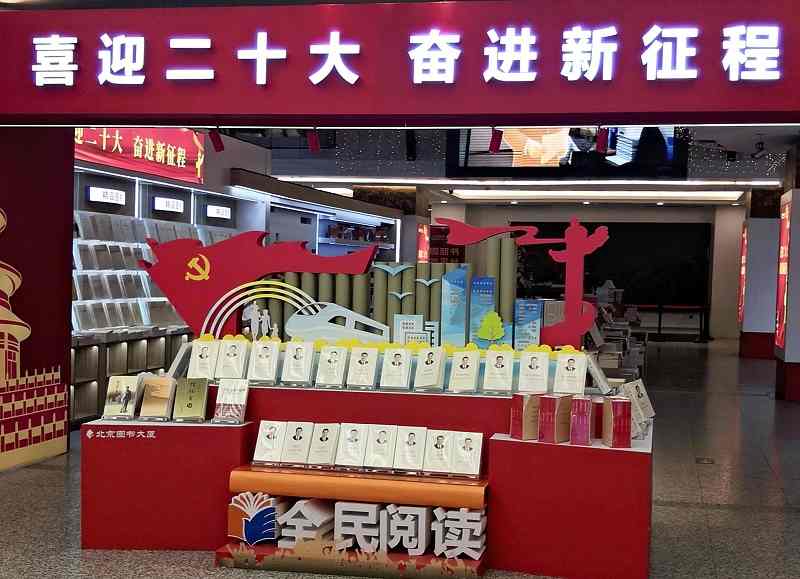China’s Xi burnishes his cult of personality with ‘achievements,’ slogans to justify third term

Women embroider in front of a photo taken during Chinese President Xi Jinping’s visit to Shibadong Village in Hunan Province on Oct. 7.
6:00 JST, October 16, 2022
In south-central China’s landlocked Hunan Province sits a village nestled in the mountains that has become a symbol of rapid affluence under Chinese President Xi Jinping’s administration.
Sightseeing buses run along paved roads while restaurants and souvenir shops line the streets of Shibadong Village, population 950, with many from the Miao ethnic minority. There are days when more than 1,000 people visit the village.
Xi visited Shibadong in November 2013 when there were no paved roads and villagers needed to leave the village to make money. After his visit, LCD TVs were distributed to houses that had only bare light bulbs.
An organization for selling traditional ethnic embroidery was also established. In 2013, the average annual income per capita was the equivalent of ¥34,000. As of last year, it was 12 times higher.
Lifting people out of poverty has been a long-term agenda of China’s past administrations. The Xi administration took over this task and declared that as of the end of 2020, absolute poverty had been eradicated among the rural population. This “achievement” has been touted as being possible because of the administration and because of Xi’s personal leadership.
The intention is to make it Xi’s political legacy to give him the authority to continue for an unprecedented third term in office, which is expected to be officially declared during the Chinese Communist Party’s National Congress scheduled to be convened in Beijing from Sunday.
“Thanks to President Xi, we became rich,” said a 79-year-old former teacher in Shibadong. “He is the people’s leader [‘lingxiu’ in Chinese].” “Lingxiu” was also the term used for Mao Zedong (1893-1976), the founder of the People’s Republic of China who was born in Hunan Province.
In a neighboring village a 10-minute drive away, houses with decrepit wooden walls stand out. Whether Xi visited a place makes a difference.
Media in China has been full of praise for Xi in the run-up to the party congress. Any criticism appears to have been silenced. The rush of propaganda is inextricably linked to the authoritarian rule that characterizes Xi’s administration.

Chinese Communist Party members are among the visitors to an exhibit highlighting the achievements of the 10 years of Xi Jinping’s administration at the Beijing Exhibition Center on Oct. 12.
Obsessed with Mao
Propaganda that visibly promotes Xi’s “achievements” in overcoming poverty are aimed at people outside the CCP. For party members, political slogans are constantly being trumpeted.
The CCP’s 19th Central Committee held its seventh plenary session, an important gathering for the CCP, from Oct. 9 to 12 in Beijing. On the final day, it released a communique emphasizing Xi’s position in the party, setting him as the “core” of the party and its Central Committee, and setting Xi’s thoughts as the “guiding ideology.”
Xi has thus solidified his position.
Two terms spanning 10 years have not been enough for Xi to realize China’s goals of unification with Taiwan and “common prosperity” for all people. It is believed that Xi has become aware of the view that, although China’s national power has strengthened over the past decade, his achievements have not matched the overwhelming accomplishments of Mao.
Furthermore, Xi, whose father was among the first generation of CCP leaders, is obsessed with maintaining the type of communist regime established by Mao. Xi has been said to be critical of the late Mikhail Gorbachev, who oversaw the breakup of the Soviet Union. He takes pride in his belief that he will be the one to protect the communist party system.
According to a senior CCP official, former Chinese Presidents Jiang Zemin and Hu Jintao are among the party elders who have tacitly approved the rapid expansion in Xi’s authority, based on the common understanding that a “strongman” — namely, Xi — is necessary to maintain the nation’s political system.

Books written by Chinese President Xi Jinping are prominently displayed at a special section on the 20th National Congress of the Chinese Communist Party in a bookstore in central Beijing on Oct. 10.
‘Who will be able to stop him?’
Some experts on CCP history, however, said that Xi’s seeking of further authorization for his power has become an objective in itself. Xi’s high-handed approach to strengthening his own authority by eliminating political foes through corruption crackdowns brings to mind the purges conducted by Mao.
In the September/October 2022 issue of U.S. magazine Foreign Affairs, Cai Xia, a U.S. resident who was a professor at the CCP’s Central Party School to nurture top party leaders, called him “a devoted student of Mao” in her article “The Weakness of Xi Jinping.”
On Sept. 27 at the Beijing Exhibition Center, which opened an exhibit on the achievements of the Xi administration in the past 10 years, Chinese Premier Li Keqiang and other Politburo Standing Committee members stood listening with serious expressions as Xi, dressed in his ubiquitous jacket, spoke in the middle of the facility. China Central Television repeatedly carried the image, which once again stressed the impression that Xi is a leader in a class of his own.
What this scene symbolizes is the fact that the collective leadership system centering on a general secretary, which had taken root after reflections on Mao’s dictatorship, has become a mere formality. Under the Xi administration, power previously limited to convening Politburo meetings and the like has expanded. A Chinese media official said that Xi’s actual power has already far exceeded what a general secretary is supposed to have.
“If Xi makes a mistake in judging a situation, will those around him be able to stop him?” one party official said.
Out of the same concern, three veteran CCP members in late August made public a document calling for the inclusion in the party’s rules of a clause stating that “party members and cadres who use their authority to engage in a personality cult shall be stripped of their party membership.” The document called for the prevention of a repeat of Mao’s Cultural Revolution (1966-1976) that plunged mainland China into chaos.
Getting in touch with one of the trio by phone, the person said, “I can’t continue this conversation,” before apologizing and hanging up
Top Articles in World
-

Israeli Ambassador to Japan Speaks about Japan’s Role in the Reconstruction of Gaza
-

Videos Plagiarized, Reposted with False Subtitles Claiming ‘Ryukyu Belongs to China’; Anti-China False Information Also Posted in Japan
-

Chinese Embassy in Japan Reiterates Call for Chinese People to Refrain from Traveling to Japan; Call Comes in Wake of ¥400 Mil. Robbery
-

Russia: Visa Required for Visiting Graves in Northern Territories, Lifting of Sanctions Also Necessary
-

China, India Tapping into Promising African Market; Beijing Announces Tariff Cuts, Both Countries Aim to Expand Exports
JN ACCESS RANKING
-

Producer Behind Pop Group XG Arrested for Cocaine Possession
-

Japan PM Takaichi’s Cabinet Resigns en Masse
-

Man Infected with Measles Reportedly Dined at Restaurant in Tokyo Station
-

Israeli Ambassador to Japan Speaks about Japan’s Role in the Reconstruction of Gaza
-

Videos Plagiarized, Reposted with False Subtitles Claiming ‘Ryukyu Belongs to China’; Anti-China False Information Also Posted in Japan


























